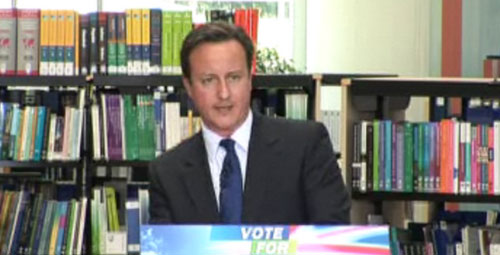David Cameron has taken the Conservatives’ promises on availability of public data a few steps further, in principle at least, in a speech at Imperial College on taking ‘broken politics’ into the ‘post-bureaucratic age’.
‘In Britain today, there are over 100,000 public bodies producing a huge amount of information,’ he said; ‘Most of this information is kept locked up by the state. And what is published is mostly released in formats that mean the information can’t be searched or used with other applications… This stands in the way of accountability.’ Now I’m still not convinced that there’s that much deliberate, conscious locking-up of data; but certainly, the formats in which that data is eventually made available often has the same end result.
OK, so we’re broadly agreed on the problem… what’s the solution, Dave?
We’re going to set this data free. In the first year of the next Conservative Government, we will find the most useful information in twenty different areas ranging from information about the NHS to information about schools and road traffic and publish it so people can use it. This information will be published proactively and regularly – and in a standardised format so that it can be ‘mashed up’ and interacted with.
What’s more, because there is no complete list that can tell us exactly what data the government collects, we will create a new ‘right to data’ so that further datasets can be requested by the public. By harnessing the wisdom of the crowd, we can find out what information individuals think will be important in holding the state to account. And to avoid bureaucrats blocking these requests, we will introduce a rule that any request will be successful unless it can be proved that it would lead to overwhelming costs or demonstrable personal privacy or national security concerns.
If we are serious about helping people exert more power over the state, we need to give them the information to do it. And as part of that process, we will review the role of the Information Commissioner to make sure that it is designed to maximise political accountability in our country.
Now don’t get me wrong here, it’s great to have Cameron’s explicit sign-up to the principle of data freedom, standardised formats, the presumed right of availability, and a 12-month timeframe. But it’s not really anything that the other major parties aren’t already talking about – and in the case of the current government, bringing in the Big Guns to actually do something about. OPSI’s data unlocking service, for example, is nearly a year old, and effectively answers the ‘wisdom of the crowd’ idea. Now it hasn’t been a huge hit… but the principle is already established.
And then there’s his unfortunate choice of public sector jobs as an example of what they might do:
Today, many central government and quango job adverts are placed in a select few newspapers. Some national, some regional. Some daily, some weekly. But all of them in a variety of different publications – meaning it’s almost impossible to find out how many vacancies there are across the public sector, what kind of salaries are being offered, how these vary from public sector body to public sector body and whether functions are being duplicated. Remember this is your money being put forward to give someone a job – and you have little way of finding out why, what for and for how much. Now imagine if they were all published online and in a standardised way. Not only could you find out about vacancies for yourself, you could cross-reference what jobs are on offer and make sure your money is being put to proper use.
Er, isn’t Mr C aware of the recently-upgraded Civil Service Jobs website – with its API, allowing individuals and commercial companies to access the data in a standardised format (XML plus a bit of RDF), and republish it freely? The Tories have talked about online job ads since December 2006; maybe it’s time they updated their spiel.
So what does today’s pledge boil down to? On one level it’s just headline-grabbing, bandwagon-jumping, government-bashing, policy-reannouncing rhetoric. But that’s not necessarily a bad thing. If all the work is going on already, but it isn’t well enough known, or isn’t proving as effective as it could/should be, maybe we should be welcoming any headlines the subject manages to grab. And if Cameron’s Conservatives do take power at the next election, and truly believe in what was said today, it would be the easy fulfilment of a campaign promise to yank these initiatives out of their quiet beta periods and into the limelight.

